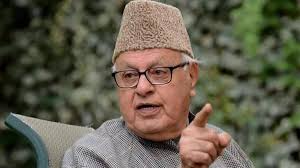Not here to beg, it is our right: Farooq on statehood demand

Srinagar, July 24 – Former Jammu and Kashmir Chief Minister Farooq Abdullah has once again raised the long-standing demand for restoring full statehood to the Union Territory. Speaking at a public rally in Srinagar, the National Conference (NC) leader declared, “We are not here to beg; it is our right.”
The 87-year-old leader didn’t hold back. He urged the Centre to respect the democratic rights of the people of Jammu and Kashmir. His remarks come nearly five years after Article 370 was abrogated and the state was downgraded into two Union Territories—Jammu & Kashmir and Ladakh.
Farooq’s Unwavering Voice
Farooq Abdullah, a three-time Chief Minister and sitting Member of Parliament, continues to be a key figure in regional politics. During his speech, he reminded the public that the removal of Jammu and Kashmir’s statehood happened without their consent.
“This land has history, identity, and a soul,” Abdullah said. “You can’t erase it by issuing an order from Delhi.” His speech struck an emotional chord with many who feel that the government sidelined local voices.
Why Statehood Still Matters
For many Kashmiris, statehood is more than just a status—it symbolizes control over their governance. After the region became a Union Territory in 2019, power shifted to Delhi-appointed bureaucrats.
Residents say this has limited local decision-making. Important policies, including land laws and job reservations, are now decided without meaningful input from the people.
“Without statehood, we are spectators in our own affairs,” said Altaf Ahmed, a local professor attending the rally. “That is why this demand is non-negotiable.”
Central Government’s Vague Promises
The Centre had promised to restore statehood “at an appropriate time.” However, it has not provided a timeline or any formal update in recent sessions of Parliament. This ambiguity has deepened public frustration.
Abdullah questioned this silence. “How long must we wait?” he asked. “Development slogans won’t hide the injustice.” He also criticized the lack of political engagement with elected regional leaders.
This growing trust deficit has widened the gap between Srinagar and New Delhi. Abdullah warned that ignoring the region’s sentiments could lead to deeper alienation.
Opposition Leaders Stand Behind Demand
Leaders across party lines have begun speaking in support of the demand. Former Chief Minister Mehbooba Mufti, along with other members of the People’s Alliance for Gupkar Declaration (PAGD), also reiterated the need for restoring statehood.
Even outside Kashmir, some Congress leaders and southern regional parties have voiced similar concerns. Many believe that Abdullah’s firm stance could reignite the issue nationally.
“Farooq sahib has moral authority,” said political analyst Rifat Ahmad. “His words carry weight both in Kashmir and across India.”
Public Sentiment Growing Stronger
On the ground, people feel increasingly disempowered. Although violence has dropped compared to past years, many residents say peace hasn’t brought real progress.
“We were promised jobs and investment,” said Bilal, a 28-year-old shopkeeper in Anantnag. “Instead, we got silence and delays.”
Infrastructure projects have been slow, and unemployment remains high. According to a recent youth survey, more than 65% of respondents wanted a return to statehood and local governance.
The lack of elected representatives has added to the feeling of political vacuum. Panchayat polls may have been held, but people still want a full-fledged assembly with law-making powers.
Statehood: A Step Toward Healing
Experts say that restoring statehood could serve as a healing measure. It would not only empower the people but also improve administrative efficiency. Local leaders could address grassroots problems more quickly than central officials.
“Bringing back statehood is not a concession,” Abdullah said. “It’s a duty under the Constitution.”
He urged the central government to act before public frustration turns into alienation. His message was clear: People are no longer asking—they are demanding.
Hope Amid Uncertainty
Despite the slow response from New Delhi, Abdullah remains hopeful. He believes that pressure from both public and political spheres will eventually force the Centre to act.
“The Constitution is not a book for display,” he said. “It protects every Indian, including those in Jammu and Kashmir.”
He ended his speech with a powerful message: “We are not here to beg. We are citizens of India, and we want what is ours.”
Conclusion
Farooq Abdullah’s renewed demand for statehood has once again put the spotlight on a promise still unfulfilled. His message echoes the collective sentiment of a region that feels neglected and voiceless. Whether the Centre listens or not remains to be seen, but the momentum is certainly shifting.






